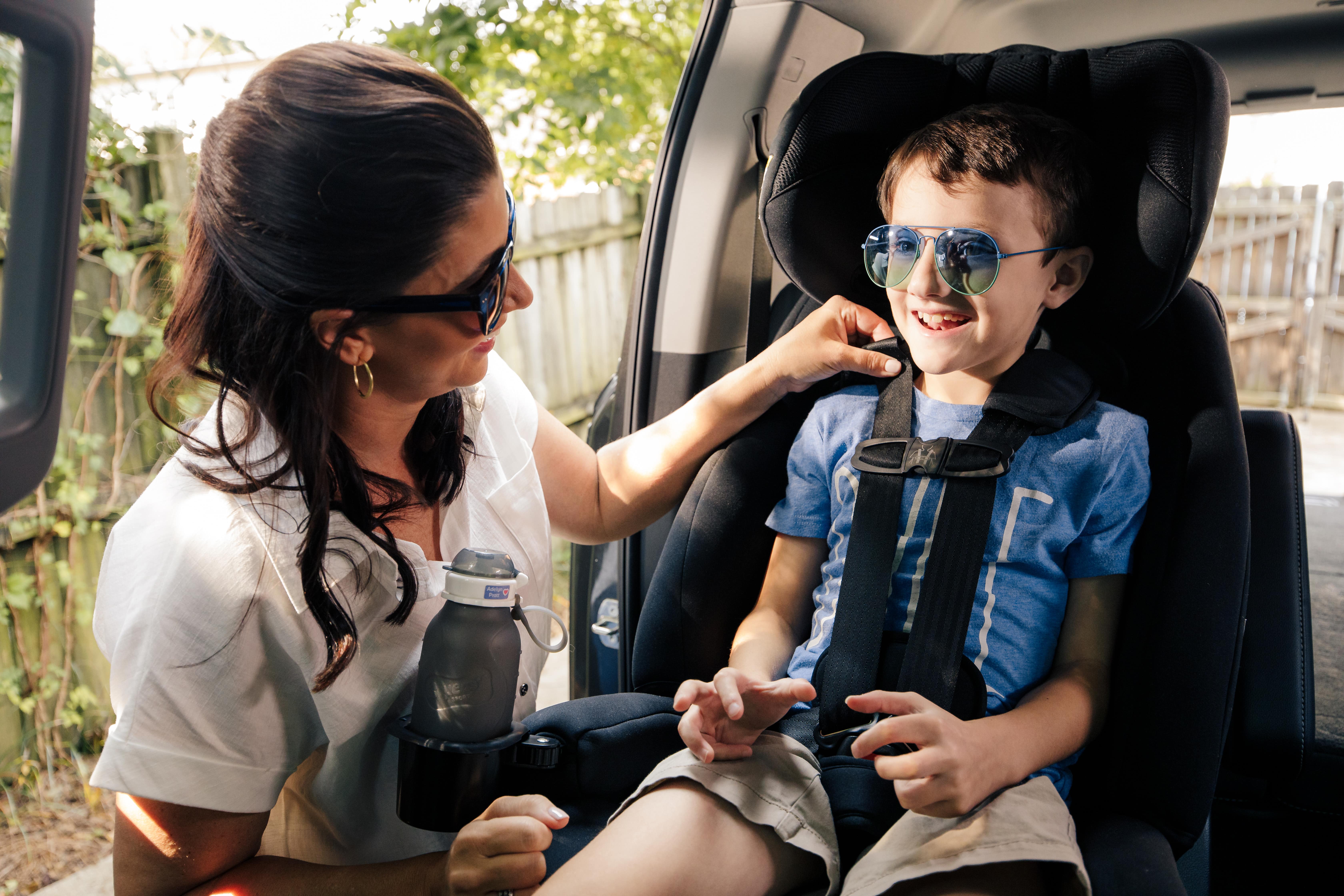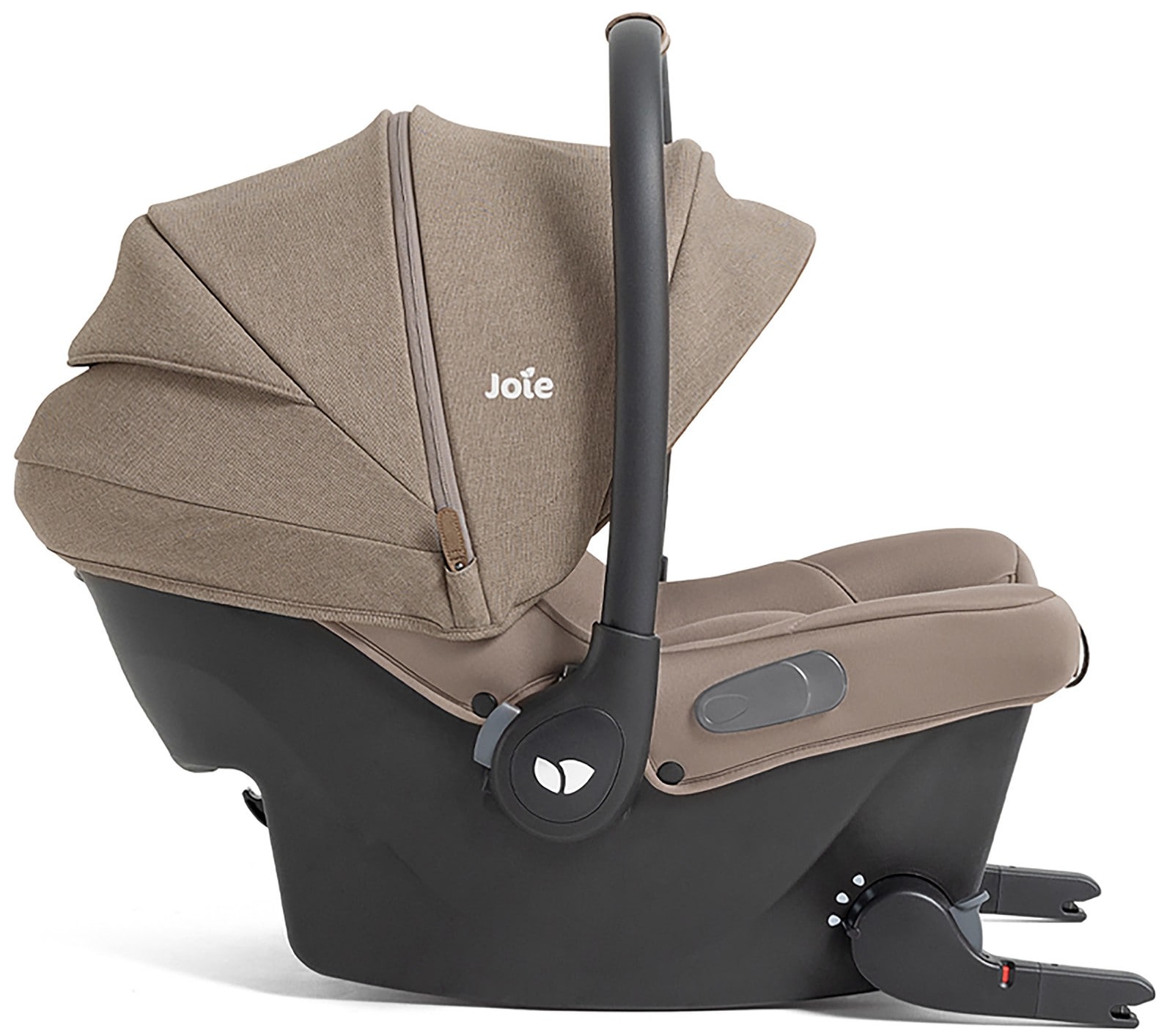Traveling with kids can be both exciting and intimidating . . . It’s a little extra intimidating when you’re flying to your destination. Kids come with a lot of extra stuff like diapers, snacks, toys, extra clothes, and their car seats, of course. And, the more items you have to pack, the more complicated your trip becomes. Though you may want to rent or check a car seat for convenience, safety should remain your number one priority when traveling. The safest way to fly is by bringing your child’s car seat onto the plane and using it!
If you’re planning to travel with a car seat, first of all, good for you! You’re making the perfect choice to keep your child (and their seat) safe during your entire trip. Second of all, you’ll need to know how the whole airplane car seat process works. That’s what we’re going to help with today! We’ll break down all the details of traveling with a car seat, so you can be as prepared and relaxed as possible on your big travel day.
Here’s how you travel with a car seat:
How To Travel With Car Seat
Purchase a seat for your child.
It’s true that you can get away with not buying a seat on an airplane for your child under 2. Instead, most airlines will allow you to have them sit on your lap. However, this is not considered safe by car seat experts or the FAA. In fact, the FAA is explicit about their recommendation that children under 40 lbs have their own seats and be properly strapped into a car seat.
So, the first step to traveling with a car seat is to purchase a ticket for your child. (Sorry, but this will be more expensive than going with the lap child option!) You need to book a window seat, as that’s where you’ll be allowed to install a car seat. However, make sure you do not purchase a seat in the exit row because passengers in those seats must be available to help in an evacuation. Kids, of course, aren’t eligible to fulfill this role and you’ll have to move.
Research the airline’s car seat rules.
Next, it’s wise to research the airline’s specific car seat and stroller rules. Most airlines allow you to use your travel system in the airport, and then check your stroller at the gate and bring your car seat on board. Most other requirements are the same. The airline, of course, wants you to use safe and approved car seats, and they have set standards on when your child must be buckled (like during landing and take-off).
Though you’ll probably have to check your stroller at the gate, there are a few compact strollers like the UPPABaby MINU V2, the Munchkin Sparrow, and the BabyZen Yoyo2. The less amount of baby gear getting checked the better. Have you seen how they handle luggage back there? The damage could be significant to your car seat or stroller!
Ensure your car seat is FAA-approved.
If you’re going to bring a car seat on the plane, ensure it passes FAA inspection. You can find this information on the car seat itself. The FAA sticker has red lettering and notes that the car seat is safe to use on a plane. Most car seats have the FAA stamp of approval, but some rotating seats don’t, so just be sure to check and make certain.
That being said, no booster seats are FAA-approved and they cannot be used on an airplane. Bring it with you and put it in the overhead bin, but your booster child will be safe using the lap belt on the plane. (Just ensure they’re always buckled up!)
Consider getting a just-for-travel car seat.
Even though most car seats pass FAA inspection, that doesn’t mean they’re all easy to travel with. If your seat is heavy and bulky, it might be best to get a just-for-travel car seat. This is especially true if you’re a frequent flier! You can find the complete list of our top travel seats here. But here are a few of our favorites:
Convertible Car Seats for Travel:
Infant Car Seats for Travel:
Decide how you’ll carry your car seat through the airport.
Traveling with a car seat isn’t just about the flight, but also navigating the airport. Luckily, an infant car seat will just click into your travel system. However, if you’re not bringing a stroller and/or have a convertible car seat, you’ll need a simple way to tote the car seat while getting through the airport and TSA security.
You can use a car seat travel bag, which will turn your car seat into a handy backpack, which you can roll up and put in the overhead bin after you install your car seat. Or, you can use a car seat cart or travel belt that will turn your car seat into wheeled luggage. We like these options best because you can strap your child in and tow them around too!
Ask to board early.
When you arrive at your gate, ask the airline representatives if you can board early. Let them know you are installing a car seat, and they’ll likely let you board first with other passengers who need extra time or assistance to get situated. This will hopefully ease some of the stress of installing the car seat and buckling up your child, without clogging the narrow aisle.
Install the car seat with the lap belt.
Next, it’s time to install the seat on the plane. In the video below, you can see how we install an infant car seat or a convertible car seat in either rear-facing or front-facing mode using the lap belt. For an infant car seat, try to match the recline to what you use in your vehicle. For convertible seats, don’t overthink the recline as long as your child can developmentally sit up without assistance. Installing a car seat on a plane is simple!
If you have to check the seat, you must protect it.
Though we really don’t recommend you gate-check your car seat or drop it off at the check-in counter if you have to do it, make sure you protect it. A car seat traveling through the baggage system can experience damage, meaning your car seat upon arriving at your destination may be unsafe to use. This is one of the reasons we’re so adamant about bringing your seats on the plane.
So, if you’re checking a car seat due to some specific circumstances, consider ways to keep your car seat as protected as possible. Check if the manufacturer of your car seat makes a travel bag. Some of these even have protection guarantees that will cover a new car seat if yours doesn’t end up in usable condition. You could also box it up in the original packaging with bubble wrap and extra fluff.
Flying with your car seat is the safest way to get to your destination!
If you’re planning a trip that involves air travel, it’s best to bring your car seat on board. This will keep your child safe during turbulence or a rough landing, and it’ll also protect your car seat and ensure it gets to your destination damage-free. This is a much better alternative to checking the car seat or renting a car seat when you arrive!
You can find more information on flying with kids on the Safe in the Seat blog! We have additional airplane safety tips, advice for bringing your car seat on the plane, airport safety hacks, and a whole list of entertaining toys to make the trip more tolerable for everyone. But, for all the best information on car seats and airplanes, take our Wheels Up: Airplane Travel Course! It’s the best way to travel stress-free with your kids and their seats. Have a great trip!
As an Amazon Associate, Safe in the Seat earns from qualifying purchases.





